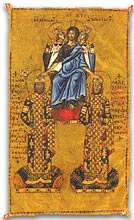The Palace and the Royal Life
< Previous | Next >
Customs untill 10th century
 In
Great Palace until 10th century,
several customs were common. First, the gate man, παπήας, used
to open the door of a palace early in the morning. A butler used to
wake up an Emperor by knocking three times on his door. After he got
dressed, Emperor would have gone to Throne Room where he would have
prayed in front of an icon. Then, he would meet his councilors. After
an audience, the gater would ring with keys to signal the end of Emperor's
Audience. The gate would have been closed by three o'clock. In
Great Palace until 10th century,
several customs were common. First, the gate man, παπήας, used
to open the door of a palace early in the morning. A butler used to
wake up an Emperor by knocking three times on his door. After he got
dressed, Emperor would have gone to Throne Room where he would have
prayed in front of an icon. Then, he would meet his councilors. After
an audience, the gater would ring with keys to signal the end of Emperor's
Audience. The gate would have been closed by three o'clock.
After 10th century
After a great period of Byzantine cultural and economical expansion,
a period of crisis came. It was due to Arab expansion in the South,
and Slavo-Avar attacks in the North. Emperor's life changed a little
bit. It got simpler, and more modest but nevertheless distinguished and divine.
Some of the rulers used to investigate the city without any escort. They wanted to improve the defence and to punish the corrupted bureaucracy.
For instance, Leo VI was even captured by the city Guard.
during one of his investigations. He wanted to know if the city patrol
was doing its job appropriately. He was walking alone, disguised, late
in the evening without any documentation. He bribed two patrols for 12 nomizmas,
and moved on. But, the third city patrol (something like the police)
arrested him. When a terrified guardian recognized the ruler in the morning, he was
rewarded to his duty, and other patrols have been dismissed and punished severely.
That ruler also surprised the monks when he came to the monastery of
Psamaty (whose igoumen Eutimyos was spiritual leader of Leo
VI), without Emperor's ceremonial, like an ordinary passenger. The
latter was usual in the relations of some rulers with Church ; i.e.
some emperors were emphasizing their sins and were trying to live almost
like monks.
Unfortunate Michael IV the Paphlagonian (1034-1041), although was afraid of conscription, used to ride at night out of the Palace. He rode frantically through the City very often.
< Previous | Next
>
|